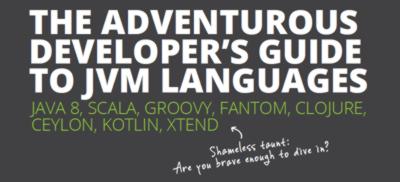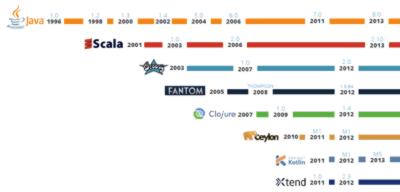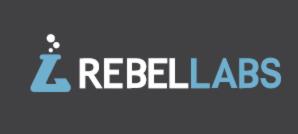| The Adventurous Developer’s Guide to JVM Languages |
| Written by Alex Armstrong | |||
| Wednesday, 13 March 2013 | |||
|
ZeroTurnaround, creators of the JRebel plug-in for the Java Virtual Machine, has brought out a 50-page report that explores Java 8 and some of the JVM languages.
The Adventurous Developer’s Guide to JVM Languages comes from Rebel Labs, ZeroTurnaround's research team and takes a look at Java 8, Scala, Kotlin, Ceylon, Xtend, Groovy, Clojure and Fantom. The team's goal was to give an understanding of where each language came from, how they evolved and where they may be going. In order to form these impressions they used the same HTTP Server example in eight implementations and the report provides links to GitHub so readers can also try them out. The report starts with a timeline that shows the current state of each of the languages chosen for inclusion: (click to enlarge)
Each of the eight language sections opens with a Getting Started with overview and then picks out specific features - for example, lambda expressions in Java 8; static typing in Groovy; functional programming concurrency in Clojure. Interoperability with Java covered in most sections.
Here's a contents list:
This is more than a manager oriented report because of the inclusion of code but also because of the quotes from the language creators. In the case of James Gosling (Java) and Martin Odersky (Scala) these are culled from outside publications but in other cases Rebel Labs has completely new quotes from the language creators and committers. Early in the document six of these "other language" experts give their views on new features in Java 8 which provides some interesting insights. The full report is free to download once you complete a registration form and receive log-in credentials.
More InformationThe Adventurous Developer’s Guide to JVM Languages Related ArticlesThe Functional View of the New Languages
To be informed about new articles on I Programmer, install the I Programmer Toolbar, subscribe to the RSS feed, follow us on, Twitter, Facebook, Google+ or Linkedin, or sign up for our weekly newsletter.
Comments
or email your comment to: comments@i-programmer.info
|
|||
| Last Updated ( Wednesday, 13 March 2013 ) |




